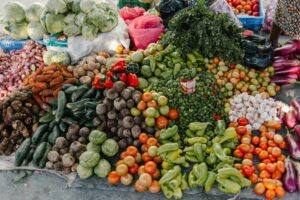 Eating healthy doesn’t have to break the bank. With a little planning, creativity, and mindful shopping, you can enjoy a balanced, nutrient-rich diet while sticking to your budget. In this blog post, we’ll explore some practical tips and strategies to help you eat healthy without emptying your wallet.
Eating healthy doesn’t have to break the bank. With a little planning, creativity, and mindful shopping, you can enjoy a balanced, nutrient-rich diet while sticking to your budget. In this blog post, we’ll explore some practical tips and strategies to help you eat healthy without emptying your wallet.
Plan Your Meals:
When it comes to saving money at the grocery store, planning ahead is essential. Pick 1 day each week and on that day, plan your meals for the upcoming week. Then, make a grocery list of everything you need to prepare those meals. Make sure to also scan your fridge and cabinets to see what you already have. You may have foods hidden in the back that can be used, or you may want to plan your meals around foods you need to use before they expire. Only plan to purchase what you know you’re going to use. This way, you won’t end up throwing away a lot of what you buy and don’t use.
Stick to your Shopping List:
Once you’ve planned your meals and made your grocery list, stick to it. It’s very easy to get sidetracked at the grocery store, which can lead to unintended purchases — and unintended expenses. As a general rule, try to shop the perimeter (the outer edges) of the store first. This is where whole foods are generally placed so this will make you more likely to fill your cart with them first. The middle of the store often contains the most processed foods. If you find yourself in these aisles, look to the top or bottom of the shelves, rather than straight ahead. The most expensive items are usually placed at eye level. Additionally, you can download a grocery list app to help you shop. Some of them can even save favorite items or share lists between multiple shoppers.
Avoid Buying Highly Processed Food:
You might be surprised to see how much you’re paying for highly processed foods like soda, crackers, cookies, and prepackaged meals. Despite the fact that they often lack beneficial nutrients and may be high in sodium or added sugar, they’re also very expensive. By skipping processed foods, you can spend more of your budget on higher quality, nutrient-rich whole foods.
Embrace Seasonal Produce:
Local produce that’s in season is generally cheaper than out-of-season options. It’s also usually at its peak in both nutrients and flavor. Produce that’s not in season has often been transported from far away to get to your store, which isn’t good for either the environment or your budget. Also, buy produce by the bag if you can. That’s usually a lot cheaper than buying by the piece. If you buy more than you need, you can freeze the rest or incorporate it into next week’s meal plans. Don’t forget your local farmers markets!
Cook at Home:
Cooking at home can be cheaper than dining out. Generally, you can feed a family of four for the same price as buying food for one or two people at a restaurant. So, make it a habit to cook at home, rather than deciding to eat out at the last minute. Some people find it best to cook for the entire week on the weekends, while others cook one meal each day. By cooking for yourself, you also gain the benefit of knowing exactly what ingredients are in your meals.
Minimize Food Waste:
Make an effort to use all the food you buy and reduce waste. Store leftovers properly, get creative with meal planning to use up ingredients, and consider composting food scraps to reduce your environmental impact.
Eating healthy on a budget is not only achievable but also rewarding. By planning your meals, shopping wisely, and making thoughtful food choices, you can enjoy a nutrient-rich diet without straining your finances. Remember, small changes can add up to significant savings and improved health over time. So, start today and prioritize your well-being without breaking the bank!




